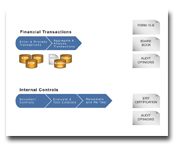The “last mile” problem is alive and well in more than the telecommunication and broadband industry.
Public companies’ efforts to comply with the Sarbanes-Oxley data retention regulations are often bedeviled by the last mile of finance, said Eric Keller, CEO of finance control software provider Movaris.
He would know. As a former CFO for technology companies in Silicon Valley, he spent years watching the monthly search unfold through that last mile. It often meant trolling documents and e-mails to capture every last number and data to crunch before releasing quarterly earnings.
“The last mile is largely hand-done,” he said, which is where most mistakes, omissions or problems with internal controls can break down. “People think of finance as finite mathematics, but there are so many judgments to make. And many companies haven’t invested in new processes to help keep those processes running smoothly during the [monthly] close.”
Movaris felt their pain while sensing its business opportunity. Close to a year since the deadline to comply with Section 404 of Sarbanes-Oxley went into effect, many companies are struggling to implement an internal control structure that fits the law’s mandate.
Section 404 requires that enterprises have data retention and retrieval processes in place, as well as solid documentation of all financial records.
With that need in mind, Movaris has released OneClose, a software suite that the company claims can unify financial statements, close tasks and Sarbanes-Oxley controls in a consistent approach.
Frank Mara, vice president of marketing for Movaris, said the platform works by linking financial controls and close tasks to financial statements during that critical last mile of data collection within any publicly regulated company.
In short, it synchronizes the activities performed during the financial close and reporting process. From there, Movaris OneClose creates a system of record for all the companies’ financial statements, its financial close and Sarbanes-Oxley compliance.
 |
| Click on graphic to view chart |
As simple as it sounds, that’s not always so easy. For many companies right now, said Mara, finding accounting errors, or numbers that don’t add up after the close means running the process again.
Plus, programming last mile data-capture functions into a company’s enterprise resource planning Mara said that’s why many companies are running what is often called a “bolt-on” system of trying to capture data properly for SOX and SEC compliance. And again, that’s costly. This is usually what can lead to material weakness disclosures and financial restatements, the proverbial black eye every public company would like to avoid. Take the experience of Sam Silvers, a global practice leader in the financial management consulting practice with consultancy Deloitte Consulting, which is using OneClose. He said the continued reliance on Excel spreadsheet-based final roll-ups of financial statements provides no official system of record for such a mission-critical task. Deloitte is using OneClose in order to synchronize the reporting information. OneClose features a secure, auditable system of record for last-mile financial reporting processes, from ERP and consolidation activities through filings with the SEC, Mara said. After all, the more a company can avoid the extra costs of auditors to help them troubleshoot accounting blind spots, the better. Other features of the OneClose suite include a financial statement console that gives managers a bird’s eye view of the close and what shape financial statements collecting is going; a Close Task Manager that helps document, standardize and automate the close process; and OneClose Binders that automatically generate detailed Close and Compliance binders for the entire distributed enterprise, which removes the need for hiring external auditors to do the same thing by hand. It also features the OneClose system of record, which Mara said captures, persists and secures all transactions and documents associated with Close and Compliance. A survey of SOX compliance last April by Raisch Financial Information Services found that one in 13 public companies had financial controls that auditors found shaky, at best. The study concluded that although SOX compliance may be costly and an overall headache, investors might be better served as a result of SOX. Movaris just wants to make sure companies don’t keep stumbling on that last mile before their numbers are publicly released.


